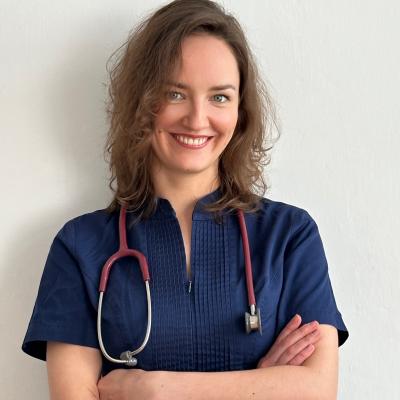General practitioner in London – primary care and consultations London
Do you need a quick consultation, prescription, sick note or referral? At our Medical Clinic in London and Coventry, you can seek help from an experienced general practitioner – without long queues and without a language barrier.
A Polish general practitioner (GP) is the first specialist you should see if you have worrying symptoms, an infection, pain or feel unwell. We offer an individual approach, complete understanding and modern diagnostics.
Appointment booking hours:
Monday - Friday 7:30am - 8pm
Saturday - 8am - 5pm
Sunday - 10am- 5pm
Our locations:
Polish Medical and Dental Clinic - Poland Medical London
377 High Road
Harrow
HA3 6EL
Tel.: 0208 903 4874
Tel./Fax: 0208 903 3455
Mobile: 077 466 231 02
Polish Medical and Dental Clinic - Poland Medical Coventry
30 Park Road
Coventry
CV1 2LD
Tel.: 024 7767 1780
Mobile: 077 126 585 38
Scope of general practitioner services
Our general practitioners (GPs) offer comprehensive care in the field of basic diagnostics and treatment of the most common ailments, including:
- consultations for infections (colds, flu, tonsillitis, bronchitis),
- prescriptions (including for regular medication),
- issuing certificates and sick notes (sick note, fit note),
- basic diagnostics (blood and urine tests, blood pressure measurement),
- referrals to specialists,
- treatment of symptoms related to the digestive, respiratory and urinary systems,
- monitoring of chronic diseases (e.g. diabetes, hypertension, asthma),
- medical consultations for children, adults and seniors.
When should you see a general practitioner?
You should see a general practitioner for a wide range of health problems, such as:
- fever, cough, runny nose, sore throat, respiratory tract infections,
- abdominal pain, diarrhoea, flatulence, food poisoning,
- rashes, itching, allergic reactions,
- headaches, weakness, insomnia,
- sudden deterioration in well-being or chronic conditions,
- the need to continue treatment started in Poland or by the NHS.
A general practitioner is often the first step towards diagnosis and further treatment, even in cases of symptoms that are difficult to classify.
Quick assistance, clear information, no misunderstandings
At our clinic, we focus on clear communication and patient comfort. Our general practitioner:
- explains the diagnosis and treatment plan in detail,
- selects medications tailored to your health and lifestyle,
- refers you for further diagnostics or to specialists,
- issues the necessary certificates (e.g. for your employer or school),
- also provides assistance to children and the elderly.
All this without language barriers, in a calm and friendly atmosphere.
Polish general practitioner in London – why is it worth it?
- Communication in English – you can freely describe your symptoms and receive clear recommendations.
- The possibility of continuing treatment from Poland (analysis of results, prescription of medicines).
- Quick access to appointments – often on the same day.
- The possibility of receiving a certificate, referral, e-prescription or follow-up consultation.
- Care for the whole family – children, adults and seniors.
General practitioner in London - Frequently Asked Questions
What does a medical doctor do?
A medical doctor is a term used to describe a doctor who specializes in general medicine and provides medical primary care. Medical doctor is usually the first contact of the patient with the doctor and in many cases is able to provide effective help, diagnose the problem and start the treatment.
We can visit the medical doctor when we are sick, but also when we need a referral for tests, specialist treatment, prescription for drugs or when we seek general medical advice.
Physician deals with the treatment of adults and children. You should see them in the event of sudden disease symptoms which are not a life-threatening condition. You should also book a consultation if you’re experiencing long-term pains of unknown cause, constant fatigue, fever, vomiting, diarrhoea, feeling unwell and other symptoms suggesting a disease. You should also seek the help of a medical doctor in case of recurring infections.
Knowledge and experience
Medical doctor’s knowledge is very extensive and covers both medical and non-medical fields (pharmacology, toxicology, laboratory diagnostics, emergency medicine, oncology and palliative care, health promotion). Medical doctor, apart from theoretical knowledge of anatomy and physiology, has extensive practical skills. Based on the symptoms, they will diagnose the disease, determine its course and prognosis. This specialist carries out full physical examination of the patient, and also performs additional tests which can help with diagnosis - blood pressure and heart rate, interpretation of the lab test results, ECG, ultrasound scan or X-ray.
Scope of treatment
• general examination of adults and children
• disease diagnosis and treatment
• tests and examinations for various professional groups, including drivers
• prevention of developmental diseases
• prevention of cardiovascular and heart diseases
• state of health statement
• referral to specialists
• referral for a hospital treatment or rehabilitation
• issuing certificates concerning the patient's health condition
• prescriptions
• sick leaves
Consultation
We go to a medical doctor with various problems, which usually don’t require immediate intervention. This could be anything from seasonal viral infections, through bacterial and fungal infections, and more serious diseases.
First step during consultation is conversation with the patient about symptoms and general health, as well as about all circumstances that may affect their health. You should expect questions about the type of work, possible addictions, past and inherited diseases. In case of a chronic disease, it is worth bringing full medical documentation to the consultation. Previous test results also help the doctor. All the information that the doctor obtains during the interview makes their work easier and helps making a diagnosis.
After the interview doctor performs physical examination, which often includes palpation, auscultation, otoscopy, blood pressure and pulse measurement, sensory examination, or skin inspection. You may be referred for additional tests such as laboratory or imaging tests or to a specialist.
Prevention
An important part of the medical doctor’s professional activity is carrying out preventive measures aimed at identifying and reducing or eliminating health risks. It also includes health promotion, health education and shaping a healthy lifestyle among various social and age groups covered by health care.
This doctor is also the first point of contact if an elderly requires long-term therapy, hospital stay, rehabilitation or palliative care.
Medical doctor is usually the first doctor patients go to.
Referral to selected lab tests
You may be referred for the following tests:
- urine tests (general, protein, glucose, amylase)
- haematological blood tests (FBC, ESR, HbA1c)
- biochemical and immunochemical (sodium, calcium, potassium, iron, urea, creatinine, glucose, cholesterol and triglycerides (TG), TSH, alkaline phosphatase (ALP), alanine aminotransferase (ALT), amylase and others)
- stool tests (general, for parasites, for occult blood)
- microbiological (urine, stool culture, throat swab)
- additional tests (PSA, FT3, FT4)
All the additional tests are done to help with the diagnosis and with choosing the right treatment for the patient. In more complicated cases, medical doctor will refer the patient to a specialist for consultation or for continuation of their treatment.


